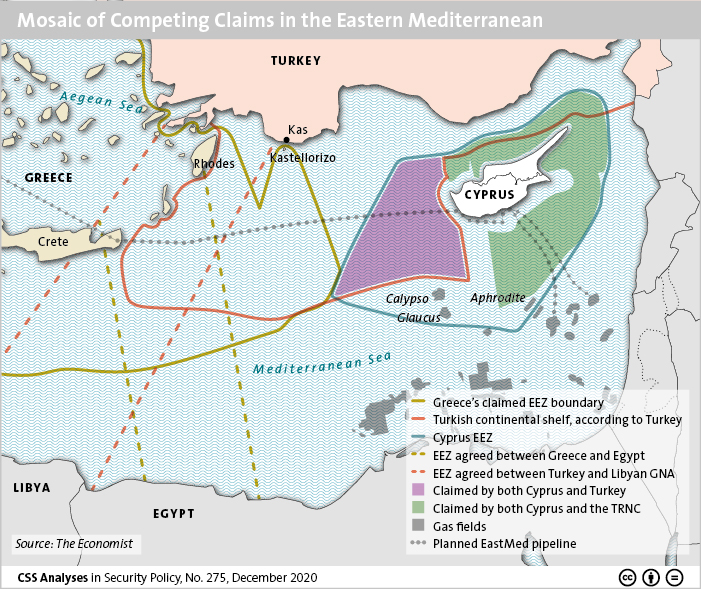
This week’s featured graphic maps the mosaic of competing claims in the Eastern Mediterranean as of December 2020. For more on Turkey and the Eastern Mediterranean, read Fabien Merz’s CSS Analyses in Security Policy here.

This week’s featured graphic maps the mosaic of competing claims in the Eastern Mediterranean as of December 2020. For more on Turkey and the Eastern Mediterranean, read Fabien Merz’s CSS Analyses in Security Policy here.

This article was originally published by E-International Relations (E-IR) on 4 April 2017.
The International Court of Justice (ICJ) has made a name for itself as various governments across the world resort to it to rule on inter-state disagreements. There are certainly valid criticisms about how the ICJ, the chief judicial body of the United Nations, operates, particularly as African governments have accused it of imposing Eurocentric international law. Some of its rulings on controversial cases have even been denounced as ‘step[s] backwards’.
Despite these criticisms, Latin American governments have regularly turned to ICJ rulings on border disputes and other inter-state disagreements. Over the past decades, the Court has ruled on numerous cases between Latin American states and enjoys a positive record so far in this region, given the generally peaceful compliance of Latin American states to the Court’s rulings. Nevertheless, the complexity of one particular case, ‘Obligation to Negotiate Access to the Pacific Ocean’, a historically-charged territorial dispute between Bolivia and Chile, may prove to challenge the credibility of the ICJ in Latin America in the near future.

This article was originally published by the Centre for International Governance Innovation (CIGI) on 18 July 2016
The recent arbitration tribunal’s ruling on the Philippines’ case against China represents a milestone both in international law and in the politics of the South China Sea. In a sweeping, magisterial, and unequivocal decision, the tribunal has moved the goalposts, changed the channel, and put China on the defensive. From this point forward the main question will not be who owns what in the South China Sea, but who does or does not respect international law. China has rejected the decision in the strongest possible terms, with evident (and no doubt heartfelt) emotion. Whether China sticks to that script or ultimately decides that the costs of noncompliance outweigh the benefits is, of course, the $64,000 question. We will have to wait and see. Meanwhile, though, here are key some things about the decision that you may not have noticed:
When it comes to maritime rights, UNCLOS trumps all. The tribunal has made clear that other state-to-state agreements or principles of customary international law can confer maritime rights, but only if they are consistent with UNCLOS principles.Put another way: if you want to be seen to be playing by the rules, you have to be seen to be playing by UNCLOS rules.

This issue of the PacNet was published by the Pacific Forum CSIS on 12 July 2016. The article first appeared in the CSIS Asia Maritime Transparency Initiative Brief
Today an arbitral tribunal at the Permanent Court of Arbitration in The Hague issued a long-awaited ruling in Manila’s case against Beijing’s claims in the South China Sea. The five-judge tribunal was established under the compulsory dispute settlement provisions of the United Nations Convention on the Law of the Sea (UNCLOS), and despite China’s refusal to participate in the proceedings, its ruling is final and legally binding. For a closer look at the tribunal’s ruling and the areas it leaves legally disputed in the South China Sea, visit the Asia Maritime Transparency Initiative’s new interactive map.
Q1: What did the tribunal rule?
The judges issued a unanimous decision in favor of the Philippines on the overwhelming majority of the claims it made against China. They invalidated Beijing’s claims to ill-defined historic rights throughout the nine-dash line, finding that any claims it makes in the South China Sea must be made based on maritime entitlements from land features. The tribunal ruled that any other historic rights China might once have claimed in what are now the exclusive economic zones (EEZ) or continental shelves of other countries were invalidated by its ratification of UNCLOS. On the question of specific maritime entitlements over disputed features, the court found that Scarborough Shoal is a rock entitled only to a 12-nautical-mile territorial sea. The judges cannot rule on sovereignty over that shoal, but ruled that China has violated the traditional fishing rights of Filipinos by not allowing them to fish at the shoal. Notably the tribunal said it would have found the same regarding Chinese fishermen if they were prevented access to the shoal by the Philippines.

This article was originally published by War is Boring on 9 July 2016.
As the South China Sea heats up, one of Beijing’s most important tools — its Maritime Militia or “Little Blue Men,” roughly equivalent at sea to Putin’s “Little Green Men” on land — offers it major rewards while threatening the United States and other potential opponents with major risks.
When the Permanent Court of Arbitration in the Hague announces its rulings on the Philippines-initiated maritime legal case with China on July 12 — likely rejecting some key bases for excessive Chinese claims in the South China Sea — the Maritime Militia will offer a tempting tool for Beijing to try to teach Manila (and other neighbors) a lesson while frustrating American ability to calm troubled waters.
This major problem with significant strategic implications is crying out for greater attention, and effective response. Accordingly, this article puts China’s Maritime Militia under the spotlight to explain what it is, why it matters and what to do about it.